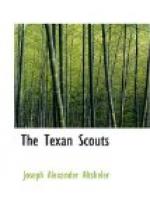But this new and little Washington was seething with excitement and suspense, and its population was now more than triple the normal. News had come that the Alamo was beleaguered by a force many times as numerous as its defenders, and that Crockett, Bowie, Travis and other famous men were inside. They had heard also that Santa Anna had hoisted the red flag of no quarter, and that Texans everywhere, if taken, would be slaughtered as traitors. The people of Washington had full cause for their excitement and suspense.
The little town also had the unique distinction of being a capital for a day or two. The Texans felt, with the news that Santa Anna had enveloped the Alamo, that they must take decisive action. They believed that the Mexicans had broken every promise to the Texans. They knew that not only their liberty and property, but their lives, also, were in peril. Despite the great disparity of numbers it must be a fight to the death between Texas and Mexico. The Texans were now gathering at Washington.
One man who inspired courage wherever he went had come already. Sam Houston had ridden into town, calm, confident and talking only of victory. He was dressed with a neatness and care unusual on the border, wearing a fine black suit, while his face was shaded by the wide brim of a white sombrero. The famous scouts, “Deaf” Smith and Henry Karnes, and young Zavala, whom Ned had known in Mexico, were there also.
Fifty-eight delegates representing Texas gathered in the largest room of a frame building. “Deaf” Smith and Henry Karnes came in and sat with their rifles across their knees. While some of the delegates were talking Houston signaled to the two, and they went outside.
“What do you hear from the Alamo, Smith?” asked Houston.
“Travis has fought off all the attacks of the Mexicans,” replied the great borderer, “but when Santa Anna brings up his whole force an’ makes a resolute assault it’s bound to go under. The mission is too big an’ scattered to be held by Travis an’ his men against forty or fifty times their number.”
“I fear so. I fear so,” said Houston sadly, “and we can’t get together enough men for its relief. All this quarreling and temporizing are our ruin. Heavens, what a time for disagreements!”
“There couldn’t be a worse time, general,” said Henry Karnes. “Me an’ ‘Deaf’ would like mighty well to march to the Alamo. A lot of our friends are in there an’ I reckon we’ve seen them for the last time.”
The fine face of Houston grew dark with melancholy.
“Have you been anywhere near San Antonio?” he asked Smith.
“Not nearer than thirty miles,” replied Smith, “but over at Goliad I saw a force under Colonel Fannin that was gettin’ ready to start to the relief of Travis. With it were some friends of mine. There was Palmer, him they call the Panther, the biggest and strongest man in Texas; Obed White, a New Englander, an’ a boy, Will Allen. I’ve knowed ’em well for some time, and there was another that belonged to their little band. But he’s in the Alamo now, an’ they was wild to rescue him.”




